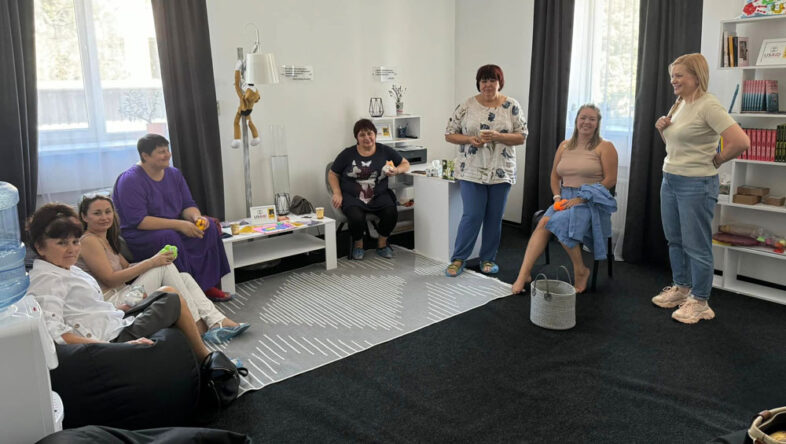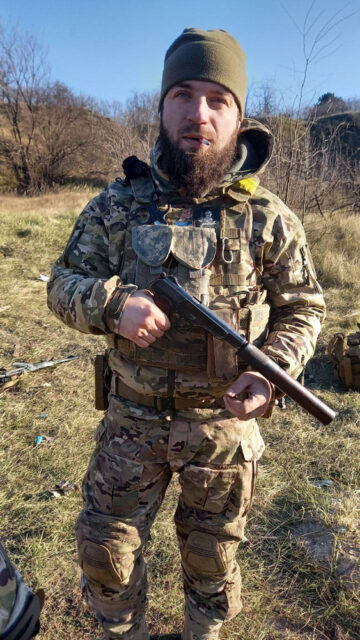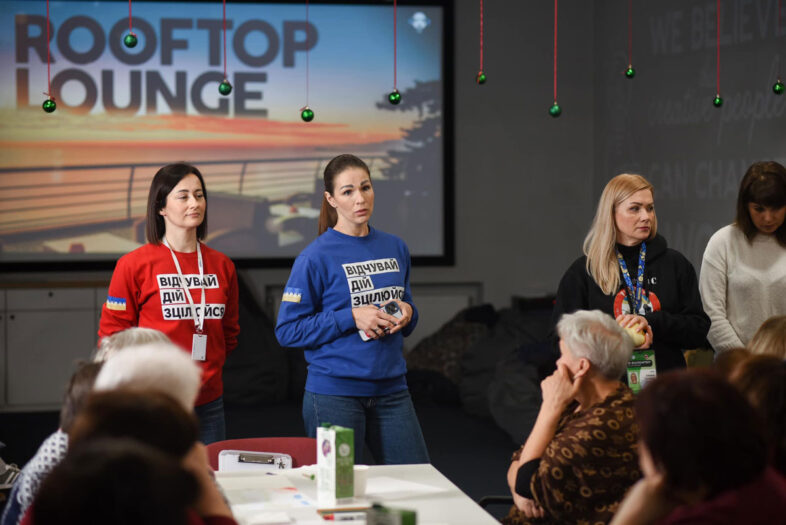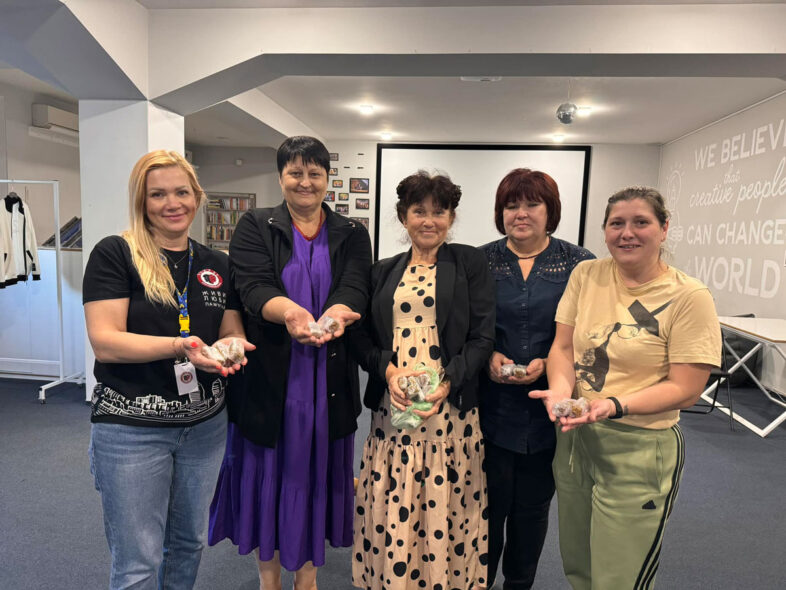For over a decade, Ukraine has endured the agonising grip of the Russian war—so far, the most brutal war of the 21st century, marked by unimaginable losses. Just these words can send a shiver down the spine, igniting a rush of despair or a surge of anger. For some, adrenaline courses through their veins; for others, the weight of cortisol hangs heavily while profound darkness settles deep within their souls.
Images flood the mind: a woman’s hand reaching out on a desolate road, haunting memories of the forest near Izium, the mountains of unidentifiable bodies in Bucha and Mariupol, and toys left at bus stops as heart-wrenching tributes to children lost to violence. The bravery of a Ukrainian POW shot by the Russians for proclaiming “Glory to Ukraine!” resonates like a battle cry etched in time.
In this turbulent landscape, poignant rituals emerge. Some scribble “For the children of Ukraine” on shells, their heartfelt messages echoing through the chaos. Yet, for others, the thought of leaving their homes feels insurmountable. They have lost sons, and the cherished words “Mom… I’ll be home soon, put the kettle on” are now a haunting refrain, a reminder of love and a future forever altered.
***
Each new day in Ukraine brings a fresh onslaught of challenges, ranging from the brutal realities of combat to the more insidious battles within—fears, loss, and despair. War infiltrates the soul like a virus coursing through the body, leaving indelible scars that etch themselves into memory. In this environment of unrelenting strife, desperation transforms fighters into heroes, for without such acts of courage, the very essence of national survival begins to crumble. Meanwhile, volunteers grapple with burnout, and psychologists find themselves swept up in an ever-deepening whirlpool of emotional crises.
We have been compelled to embrace life with a fervour that borders on obsession, prompting us to seek answers through innovative methods of mental health restoration. Each morning, the struggle to rise becomes a testament to resilience; without these efforts, facing another day feels insurmountable. Psychological self-care has emerged as a crucial tool—a shield and sword in the relentless fight for one’s soul.
This self-care encompasses a myriad of methods and techniques, employed either in solitude or with the guidance of a curator, psychologist, or coach. Yet, it’s important to acknowledge that in the midst of war, qualified psychologists and psychotherapists are also in short supply. They, too, bear their own wounds, navigating their trauma while striving to help others—a paradox that underscores the profound complexity of this ongoing struggle.

What does self-help look like in the throes of trauma? It can manifest in myriad forms—a group gathering, a volunteer initiative, or intimate conversations with friends who have shared similar experiences. Recently, in Dnipro, the “Inhale. Exhale” project was launched, offering a recovery program tailored for burned-out volunteers. This initiative features an array of workshops, from pottery masterclasses to playback theatres, as well as art therapy and individual psychological consultations. These activities have drawn together approximately 100 volunteers, all seeking to recharge their spirits in order to continue their vital work.
The ethos of “help yourself” traces its roots back to the humanistic psychology movement of the mid-20th century. Pioneering figures like Carl Rogers championed the belief that individuals possess innate resources for their own healing. He posited that sometimes, a specialist is unnecessary; simply listening to oneself and tapping into these inner reserves can suffice. Yet Rogers was not alone in this pursuit of self-discovery and healing. Practices such as Buddhist or Hindu meditation, engaging in artistic endeavours, or even embarking on travels have become vital avenues of self-help for those who find themselves adrift, grappling with a sudden loss of purpose. In these quiet acts of introspection and creativity, many seek not just solace but a path toward renewal.
In Ukraine, psychological self-help has become incredibly important, emerging as a vital necessity following the widespread devastation from mass shelling, injuries, and heavy losses. The struggle for survival has turned into a shared experience as whole communities deal with the emotional impact of the ongoing war.
Among the most harrowing challenges faced by individuals is the profound loss of loved ones, homes, and a sense of peace. For many families, the weight of grief can feel insurmountable, often morphing into an unbearable burden. In this context, psychologists have proposed various techniques that serve as lifelines in a turbulent sea of sorrow.
The first technique, writing therapy or journaling, provides a cathartic release for those who have lost loved ones in the war, allowing them to articulate emotions they find difficult to express aloud and facilitating a journey toward healing and reflection. The second technique focuses on emotional regulation, empowering individuals to manage their feelings through practices such as deep breathing, meditation, and body-oriented therapies like yoga, tapping, or running, which help reduce anxiety levels heightened by wartime stress. Lastly, cognitive-behavioural therapy (CBT) serves as a vital tool, enabling individuals to reframe their trauma and learn to coexist with their grief without succumbing to guilt or anger. Through these approaches, those navigating the tumultuous waters of loss may find the means to reclaim a semblance of control in a world irrevocably altered by war.
Techniques tailored for military personnel represent a distinct category, given that they constitute one of the most vulnerable groups during wartime. While some fear that the war will return individuals from the front lines who are irreparably altered, the soldiers themselves, drawing lessons from the experiences of other nations, have developed their own methods of self-help. Remarkably, many of these veterans often reintegrate into civilian life with greater ease and composure than their non-military counterparts.
Speaking as someone who has volunteered and collaborated closely with these comrades in a variety of situations, I’ve witnessed how their resilience and coping strategies can be surprisingly effective in soothing civilians grappling with their own anxieties. At times, the very skills that soldiers hone in the crucible of war serve as a balm for those who feel they are losing their footing amidst the chaos of war.
Serhiy Prutskykh, a serviceman from the Nachtigall Unit and author of the video blog Bearded Muesli:

“We need to lead by example, not just for those on the front lines, but for everyone in their daily lives. There are moments when we feel overwhelmed and times when exhaustion seems all-consuming, but it’s crucial to have a few techniques or traditions to help us reconnect with ourselves. After particularly tough days, my comrades and I often gather for tea ceremonies. We sip our tea and share stories, and while the war may hover in the background, our conversations aren’t always focused on it. Personally, I’ve embraced meditation in its many forms to help calm and balance my mind. I believe that psychologists play a vital role in maintaining mental health during these trying times. However, it’s essential to recognise that military and civilian psychologists operate in very different realms.
When crisis strikes, people instinctively reach out for support. Self-help groups have emerged as crucial tools for psychological recovery. In Ukraine, while these groups are still finding their footing, those who are active are making a significant impact by working closely with the families of fallen soldiers and those anxiously awaiting the return of their loved ones. They embody the principle of “one of our own to another” or “peer to peer,” which resonates deeply within any community of like-minded individuals. For a child, the connection with other children can feel more natural; for someone grappling with chemical dependency and seeking treatment, finding understanding among peers who won’t judge is often the first step toward healing.”
For veterans, conversations about the war or shared experiences resonate most deeply with those who have faced similar challenges and are open to connecting. It’s in these exchanges—whether through dark humour or earnest discussions about the grim realities of the war—that a sense of camaraderie is forged.
Such interactions foster a profound sense of belonging within a community that understands the weight of shared experiences, where fears and doubts can be expressed openly, and vulnerability is met with empathy rather than ridicule. The charitable foundation “TAPS” (Ukraine) exemplifies this approach, bringing together individuals burdened by the loss of loved ones in the war. Through its initiatives, it teaches participants to navigate their grief collectively, transforming their shared pain into a source of strength and support.
Yuliya Dmytrovа, head of the TAPS charitable foundation that supports families of fallen soldiers:
“In these self-help groups, families of fallen soldiers discover not just support but the resilience to face life’s most challenging moments. Since 2018, our foundation has organised forums and launched camps, bringing together mothers, wives, and parents led by psychologists. Through conversations with those who understand their struggles, they find a renewed sense of hope and the reassurance that they are not alone.
Organising both offline and online self-help groups has become a crucial focus for us. Many are hesitant to seek individual therapy, and there simply aren’t enough psychologists to meet the demand. By connecting with us, families enter a community of like-minded individuals. Over time, these connections evolve into friendships that go beyond shared grief to include common interests like sports, masterclasses, theatre, and music. Some even step up as facilitators to support new participants. The self-help techniques we teach empower them, instilling hope for a brighter future.”
These groups also serve as vital spaces for exchanging coping strategies and experiences, helping participants manage their emotional burdens more effectively.

Yevheniya, who lost both her son and husband in the war:
“I first lost my husband and then my son. I couldn’t eat or sleep. I reached out to a psychologist at TAPS, which helped, but being part of a group is far easier. We learn relaxation techniques and new behavioural models. Now, I’m equipped to support others like me, as well as military personnel, since I am a servicewoman myself. Together, it truly becomes easier to navigate the traumas that war inflicts.”
They undergo specialised training to assist others in coping with their losses in the future.
Larysa, mother of a fallen defender:
“When I lost my son, I thought my world had shattered forever, and I didn’t want to go on living. Initially, I couldn’t quite believe that simple conversations would help. However, after six months, I discovered a way to cope with the pain as I learned alongside other mothers and wives. Here, I am surrounded by women who share my experience. I found the strength within myself to support others because I now have both knowledge and experience. A psychologist from the foundation guided us through this challenging journey.”
Mothers and wives who have lost their husbands and children often emerge as the most compassionate guides for other families, demonstrating that a return to life is indeed possible.
For those not yet ready to join a group, the TAPS team has developed an online self-help guide for military personnel and their families.

Svitlana Timofeyeva, lead psychologist at the TAPS foundation and author of the guide:
“We didn’t just create a theoretical guide; we compiled practical advice that truly makes a difference during life’s challenging moments. The team behind this guide possesses extensive experience in preserving mental health. The book offers actionable strategies for supporting oneself and others during wartime or after returning from the front. We aim to cultivate a society where everyone feels at home, where asking for help is not only accepted but encouraged, where individuals can tackle their problems independently, and where they can learn to support one another.”
Participants in psychological self-help groups consistently report the positive impact of this practice on their lives. Research conducted by psychologists in Europe and the United States shows that involvement in such groups can reduce anxiety and depression levels by up to 70% among those affected by traumatic events.
In Ukraine, participant feedback indicates significant positive changes, even though current statistics may not fully reflect the reality due to the ongoing war.
Dnipro stands as a stronghold not only in humanitarian and military terms. Since 2014, the city has confronted the initial consequences of wartime losses, giving rise to numerous organisations and initiatives dedicated to psychological support. Notable among them are the TAPS Foundation, Forpost NGO, Psychological Support Centre “RAZOM z toboyu,” the NGO “Crisis Psychological Assistance in Dnipro and the Region,” and ProZHYTY Space.
As the war infiltrates the lives of every Ukrainian, prioritising mental health has become as vital a contribution to victory as supporting the Armed Forces of Ukraine. While the war may eventually end physically, its memories will remain etched in the minds of Ukrainians. Once merely a trendy topic, the notion of ‘having a psychologist’ is evolving into a crucial aspect of healing the human spirit—one that yearns for happiness even in the darkest hours, which often precede the dawn.

